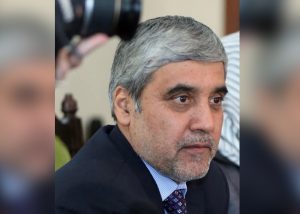We Need a Society Where all women’s fundamental Rights Are Fulfilled

The socio-cultural environment, along with the security challenges, is the main factor for women’s lack of access to their basic rights. Therefore, special attention must be drawn to public awareness to improve the situation and provide more opportunities for women.
According to Sayed Agha Hossein Fazel Sancharaki, the former Deputy Minister for the Information and Culture Ministry, old-fashioned traditions, continued conflict and growing insecurity are the main drivers holding women back to flourish in society. He believes if a permanent ceasefire is put into place, women will gradually enjoy their fundamental rights.
CSHRN: How to improve the current situation?
Sancharaki: Cultural development, along with ending the conflict, will help transform the social mentality and improve social awareness on citizenship rights, human dignity, especially those of women. However, must work needs to be done to reach that point.
In essence, economic, social, and cultural development are intertwined as one influence the other. Therefore, mass media, CSOs, and government are having key responsibilities to work together to improve social awareness, eradicate poverty, and develop social social-welfare.
CSHRN: What is your assessment of the peace talks?
Sancharaki: As some Afghan negotiating team members said, I am not much optimistic about the outcome of the talks. The Taliban’s harsh views on human rights have not yet changed. If peace talks fail, the situation for human rights will further decline.
CSHRN: Will women accept restrictions of their rights?
Sancharaki: Many things depend on the Taliban’s understanding of the realities of Afghan society. Nevertheless, the group’s behavior over the last twenty years clearly demonstrates atrocities only such as stoning, killing, and burning.
CSHRN: How can women’s presence in the peace talks affect the Taliban’s view of women?
Sancharaki: The presence of women in the Afghan negotiating team is a plus and highly appreciated despite the fact that no woman is present in the Taliban’s team.
CSHRN: How can the Taliban’s presence affect civil society activities?
Sancharaki: Well, it largely depends on the agreement. If the peace deal grants the Taliban the authority to influence public lives, of course, the group will attempt to restrict the space for civil society activists, media, women, and ethnoreligious minorities. However, if they become only part of the power, then the group will assimilate into the society given the chances happened so far.
CSHRN: What important issues should be discussed with the Taliban?
Sancharaki: The constitution, republic system, human rights, mainly those of women, freedom of expression the press, and gender equality are critical points to be discussed but should not be opened to compromise.
CSHRN: Should women’s rights be restricted for the cause of a peace agreement?
Sancharki: No restrictions should be accepted. If the Taliban deal with women and minorities’ rights based on their understanding of Sharia law, then women will be confined to home. The agreement must preserve all human rights and democratic values.
CSHRN: What should guarantee the Taliban’s compliance with the possible peace agreement?
Sancharaki: Although many countries and international organizations such as the United Nations, USA, Qatar, Germany, Turkey, and Uzbekistan are supporting the peace process, I believe the real guarantors for the group’s compliance will be the strong presence of Afghan people, civil society, media, and civil activists. Otherwise, the Taliban will breach the terms of the agreement.
CSHRN: What is your prediction of the peace agreement?
Sancharaki: The progress and outcome of the peace talks largely depend on the US presidential elections. If the US uses the Afghan peace talks and troops withdrawal as an electoral campaign or not, everything will become known once the election is over.